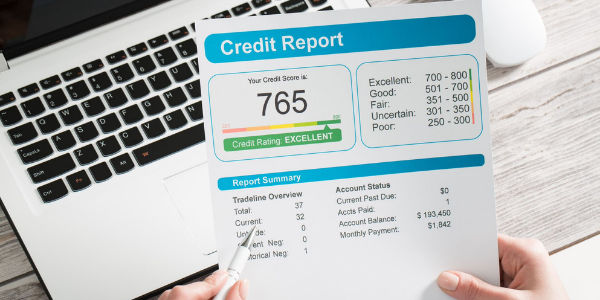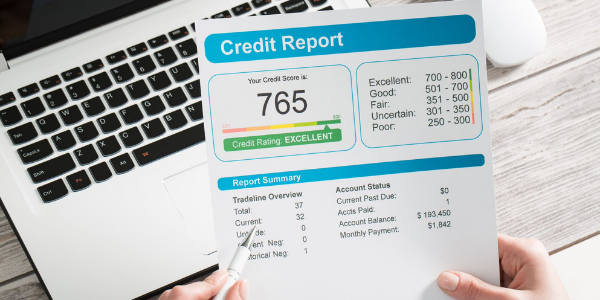
Protecting your credit score is important all the time, but even more so when you’re thinking about buying a home and need a mortgage loan. That’s because there aren’t many other times in our lives when we need a loan amount of this size.

That means that in addition to getting your finances and paperwork in order before you buy a house, you’ve got to safeguard your credit score like nobody’s business. Thankfully, there are a few easy, low-cost ways of doing this, which will make qualifying for a mortgage loan a much more convenient process.
1. Pull Your Credit Report Annually.
Protecting your credit score during the home-buying process starts with knowing what that credit score is. You can pull your free credit report at annualcreditreport.com, which provides information from all three nationwide credit bureaus: Equifax, Experian, and TransUnion. These credit bureaus are required to give you a free credit report once every 12 months.
Be sure to give every credit report a thorough review. You want to ensure that all the information is accurate, including names, addresses, Social Security numbers, account names/numbers, and loans. If you find something that doesn’t look familiar or correct, contact the business associated with that entry or the credit bureau that provided the report.
2. Monitor Your Credit with Alerts.
Plenty of companies are happy to monitor your credit score, so you don’t need to pay a lot of money for this service. For example, Experian offers free credit monitoring, as does Credit Karma.
Credit monitoring companies typically provide an updated credit report every 30 days, ensuring that you stay on top of any unfamiliar activity. They can also deliver real-time alerts if your account receives new inquiries, an account is opened, your personal information changes, or other suspicious activity is recorded.
These alerts are typically customizable, allowing you to dictate the levels of sensitivity. We recommend setting these alerts to the highest levels when trying to protect your credit score during the home-buying process.
Your bank and credit card providers will also watch for fraudulent activity, though this isn’t a substitute for credit monitoring. Multi-factor authentication can also help keep your accounts safe.
3. Utilize a Credit Freeze (if Necessary).
One of the best things you can do when trying to protect your credit score during the home-buying process is to freeze said credit if you suspect fraudulent activity. A credit freeze prevents others—including mortgage lenders—from accessing your credit report, so don’t take this step lightly. However, if you’re dealing with a case of identity theft or fraud, it’s better to halt all activity until the issue has been sorted out.
Be sure to file a credit freeze with each credit bureau to ensure that it’s effective. If you freeze your report only with Experian and TransUnion, for example, someone could still steal your identity or try to open up an account by pulling a credit report from Equifax.
It doesn’t cost anything to freeze your credit. But you do have to remember to unfreeze it—or “thaw” it—before you can open a new account or have your credit pulled. In other words, you can’t freeze your credit and then fill out a mortgage application.
Since mortgage lenders need access to this information, you’ll need to unfreeze your account before applying for a mortgage loan. That’s why it’s always a good idea to be proactive in reviewing your credit and clearing up any concerns long before you’re ready to visit a loan officer.
4. Learn to Recognize Phishing Emails and Calls.
Have you looked into your car’s extended warranty yet? That’s just one of the scams going around nowadays. While many of us may be clued into the fact that lottery winners, princes from foreign lands, and cryptocurrency kings probably aren’t going to send us that $2 million that’s purportedly stuck overseas, there are many other scams that are harder to spot.
Some look like above-board investments with excellent returns. Others involve a scammer posing as a loved one who is in trouble and needs your help (and money). Sophisticated criminals will even pose as your bank, someone affiliated with one of your credit cards, or the IRS.
Though their scripts vary, the ruse always ends with them asking for details linked to your identity or financial accounts—or simply demanding this info upfront. Part of protecting your credit during the home-buying process is knowing how to spot these crooks.
Never provide personal information to an outside party that contacted you. Banks, credit cards, and the IRS will never ask you to verify information in an email. If you receive a call requesting these specifics, take down the details and call your institution directly.
If it’s legit, any representative will be able to assist you from there. It’s also important to remember that the IRS and other government agencies will never call or email you. They send all their communications via regular mail.
5. Don’t Apply for New Credit.
A large part of the mortgage application process involves determining your DTI, or debt-to-income ratio. This formula divides all your monthly debts (credit cards, student loans, housing, etc.) by your gross monthly income (pre-tax wages earned from salary, commissions, bonuses, freelance work, etc.) to get a percentage.
Though every situation is different, a DTI of 43% tends to be the limit for most loan programs. Although a handful will go higher—with a higher interest rate as well.
If you apply for new credit—say, you’re buying a new car, buying furniture on credit cards, or taking out a student loan for your child—that debt must now be factored into your DTI. Maybe you’ll be okay, maybe you won’t, but mortgage lenders don’t typically like surprises.
And most borrowers don’t enjoy the surprise of obtaining pre-approval, having their bid accepted, and then watching the mortgage loan fall apart because of a new credit application or increased credit limit. It’s best to wait until after your loan closes before seeking out additional credit or making large purchases.
Protect Your Ability to Get a Home Loan
Protecting your credit score during the home-buying process is one part art and one part science. Do what you can to prevent others from ruining your good name while ensuring that your credit score and report are as flawless as possible before you apply for a mortgage loan.
If you can achieve this while maintaining a decent credit score, a favorable interest rate will most likely be your reward! This will be true whether you want to apply for a fixed-rate loan or an adjustable-rate mortgage (ARM).
APM is ready to walk you through the mortgage application process. Find an APM Loan Advisor near you today to ensure that you’re well on your way to buying a home!








